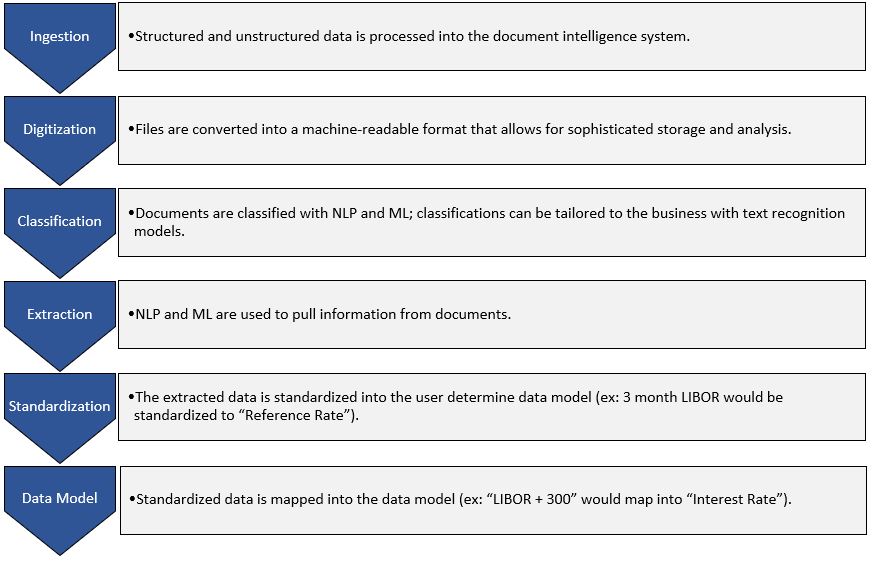As previously discussed in SOFR is the New LIBOR, one of the key issues regarding the transition of $35 trillion in USD LIBOR assets to an alternative reference rate is the lack of sufficient fallback language. Inadequate fallback language gives rise to an assortment of complications when attempting to analyze contracts using traditional technologies. Fallback language is the contractual provisions that outline the procedure for transitioning to a new reference rate.
Fallback Language Elements:

Issues with Fallback Language
Numerous issues arise when analyzing the fallback language of assets tied to USD LIBOR. Contracts often fail to designate a benchmark replacement rate and therefore leave managers without a clear resolution plan in the occurrence of a fallback trigger event. Most of the language was designed to alleviate temporary gaps in benchmark rate reporting rather than the permanent termination of LIBOR. Consequently, the appropriate benchmark replacement is unclear.
Compounding the lack of clarity is the absence of a standardized contract structure across various derivatives and cash products. Moreover, many contracts lack the existence of fallback language altogether. The involvement of multiple parties further complicates fallback language negotiations due to a misalignment of priorities. The amalgamation of these issues has hindered firms from storing asset contracts in a sophisticated document repository with search capabilities and often warrants the manual review of individual contracts.
Addressing the Situation
Changes to the structure of a fund’s holdings and operations command careful planning and execution. Amendments deriving from the termination of LIBOR mandate the construction of meticulous roadmaps and the design of new business procedures. Their creation is impossible without the knowledge of USD LIBOR assets and processes. It is vital to take a detailed inventory of all holdings, systems, and operations that are subject to change. Consolidating contracts into one or more defined document repositories augments the renegotiation process by facilitating the application of targeted remediation strategies.
Following the familiarization of contracts and their storage, the application of document intelligence solutions can greatly enhance the navigation of fallback language with tools such as natural language processing (“NLP”) and optical character recognition (“OCR”). Document intelligence has shown the ability to decrease cost by 80% and processing time by 90%; while increasing accuracy and consistency by 25% and 50%, respectively. The classification and normalization of data augments your contract review team’s ability to analyze contracts. Additionally, NLP and machine learning (“ML”) technology enable access to vital information that was formerly lost in traditional document repositories.
How Document Intelligence Works:

More on Document Intelligence Systems
Document intelligence solutions automate the ingestion of contracts, extract and structure key data, and automate contract repapering. Repositories frequently lack the advanced search capabilities required for evaluating fallback language. The implementation of a document intelligence system that automates the ingestion of structured and unstructured contracts can fill this gap and streamline your firm’s technological infrastructure.
Document Intelligence solutions transform key contract data into structured data models that allow for advanced search capabilities. Next, the solution automates various components of the contract repapering process such as generating the proposed amendments. Contract repapering functions can be paired with workflow tools to further streamline the process. The assortment of features offered by a document intelligence solution result in significant time and costs savings while boosting accuracy.
FinServ Can Help
Why tackle this arduous task alone when industry experts are eager to help? FinServ’s project management and industry expertise can provide value through the various stages of negotiating fallback language. FinServ can lead the implementation of your desired document intelligence solution, construct a comprehensive inventory of your firm’s contracts, and manage the integration of existing infrastructure with your new system.
We can produce a detailed overview of the document intelligence solution, it’s interdependence with various internal and external systems, and design the procedures associated with its use. FinServ understands that proper documentation is essential for mitigating regulatory risks, validating business procedures, and streamlining training.
About FinServ Consulting
FinServ Consulting is an independent experienced provider of business consulting, systems development, and integration services to alternative asset managers, global banks and their service providers. Founded in 2005, FinServ delivers customized world-class business and IT consulting services for the front, middle and back office, providing managers with optimal and first-class operating environments to support all investment styles and future asset growth. The FinServ team brings a wealth of experience from working with the largest and most complex asset management firms and global banks in the world.

